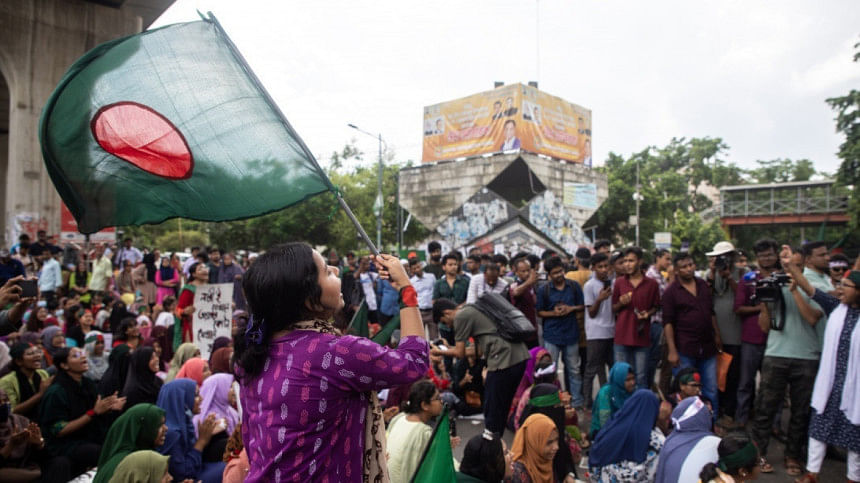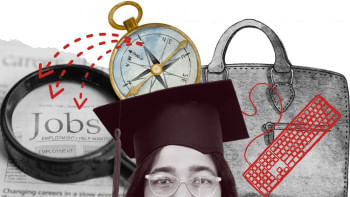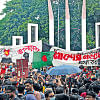Young people need opportunity and mentorship, not token gestures

Bangladesh, with its demographic dividend and more than one-third of its population under the age of 35, stands at a critical crossroads that tests the nation's preparedness. As the World Economic Forum continues to highlight emerging jobs and essential future skills, including critical thinking and complex problem-solving, we must ask: are our systems, institutions, and mindsets equipping young people to thrive in this evolving landscape? Alarmingly, even students at Stanford University, in the heart of Silicon Valley, are voicing concern that they are not learning anything in class. This points to a global disconnect between education and employability. If even the most elite institutions are falling short, what does that say about our own theory-based and exam-driven classrooms in Bangladesh? Are we truly preparing our youth to lead in the age of disruption?
Beyond the challenges of formal education, there is a quieter crisis unfolding in the everyday lives of young people in Bangladesh: the steady erosion of social skills. With the average youth spending several hours a day scrolling through social media, the ability to hold meaningful conversations, practise empathy, and engage in real human connection is gradually weakening. What was once a vibrant culture of community gatherings, spirited dialogue, and shared lived experiences is gradually dissolving into a device-driven existence where likes, shares, and filtered images often replace authentic human connection. Streets that once echoed with laughter, debate, and spontaneous conversation now fall silent as heads remain bowed to glowing screens. As virtual validation begins to outweigh self-awareness, we must pause and reflect. Are we raising a generation that is slowly forgetting how to connect person to person without using digital tools?
Another critical concern is the persistent wave of brain drain. Each year, thousands of Bangladesh's brightest minds leave the country in search of better education, meaningful work, and environments that reward merit, creativity, and innovation. Many do not return. While global mobility is a natural part of a connected world, the alarming rate at which our top talent is seeking opportunities abroad signals a deeper problem. Young people are not just looking for higher salaries or foreign degrees, but dignity, purpose, and opportunities free of corruption, red tape, or stagnation. The Bangladeshi passport's low global ranking not just limits travel opportunities for many young people but hinders global recognition as well. When a nation invests in its youth only to lose them at their most productive stage, it must ask itself: do we have a country our young people want to shape, or is it one they feel forced to escape?
The struggle to find meaningful employment has become one of the most disheartening realities for young people in Bangladesh. Each year, thousands of university graduates face a job market that offers more rejection than opportunity. Many find themselves waiting endlessly, moving from one temporary role to another, or simply settling for jobs that do not match their skills or aspirations. The formal economy remains limited in its capacity to absorb the growing number of job seekers, pushing many into the informal sector, where work lacks future security. In Bangladesh, many young people turn to startup dreams as an escape from unemployment, hoping to innovate and succeed on their own terms. Yet global research shows that it is often older founders, with experience and deeper insight, who build the most successful ventures. How can we expect young entrepreneurs to thrive when they face a world that romanticises youth but offers limited ground support or space to grow?
Many young people in Bangladesh are also grappling with deep confusion brought on by the double standards they see around them. Both globally and locally, the contradictions are striking and hard to ignore. Tech companies preach privacy rights, while at times, quietly profiting from user data behind the scenes. Climate summits are filled with pledges to reduce emissions, yet the same leaders arrive in private jets and approve new fossil fuel projects. Superpowers advocate for democracy abroad while maintaining alliances with authoritarian regimes that serve their interests. Nuclear-armed countries call on others to denuclearise while refusing to dismantle their own arsenals. Nations open their borders to some refugees while closing them to others based on race, religion, or politics. Athletes are praised for activism until their views challenge powerful sponsors. For young people trying to make sense of right and wrong, values and ambition, these contradictions disorient them, eroding their trust. How can we expect this generation to follow a clear moral compass when the world around them keeps shifting the lines?
In the face of contradiction, disillusionment, and structural barriers, a growing wave of young people in Bangladesh is choosing not to be silent or sidelined. They are stepping into leadership roles, organising within their communities, creating civic platforms, and using digital tools not just for expression but to drive meaningful change. From climate advocacy to education reform, from championing social justice to promoting green enterprise, young voices are not only asking for inclusion but also proving their readiness to lead. What they need now is not symbolic praise but genuine space, consistent mentorship, and institutional support. The future of governance cannot be shaped without the participation of those who will live it and inherit its consequences. If we choose to trust our youth, challenge them with purpose, and include them in building the present, we will not only nurture better leaders but also build a stronger and more just Bangladesh.
Dr Iftekhar Ul Karim is assistant professor and director of executive education & industry outreach at BRAC Business School, BRAC University. He can be reached at [email protected].
Views expressed in this article are the author's own.
Follow The Daily Star Opinion on Facebook for the latest opinions, commentaries, and analyses by experts and professionals. To contribute your article or letter to The Daily Star Opinion, see our guidelines for submission.

 For all latest news, follow The Daily Star's Google News channel.
For all latest news, follow The Daily Star's Google News channel. 










Comments